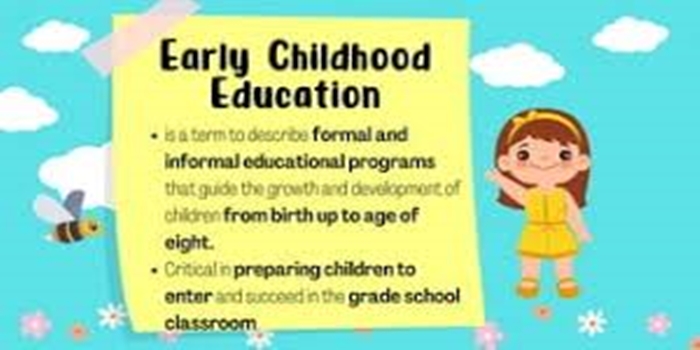In this article, we discussed the meaning of early childhood education development and stages we also talked about the role of an early and area of childhood
Definition
Early childhood education and development (ECE) is the formal and informal teaching of children from birth to age five. It’s a crucial time for children’s brain development, and quality ECE can help establish a foundation for success in many areas of life.
Early childhood development refers to how a child grows and develops physically, emotionally and socially in the first years of life. It also refers to how their communication and cognitive skills develop over time. All of these areas of development are involvedly linked, and are important in a child’s early years.
Stages of Child Development
Each stage of development surrounds advances across different domains. These various developmental domains are reliant, and a child is unable to advance in one sphere without progressing in the other. And remember – your child will grow at their own pace.
Communication Domain
Children have to learn to be able to communicate effectively with their family, peers, teachers, and more. Communication is the first step that develops across the stages of child development, which will progress into conversation skills and directing relationships as they grow older.
Physical Domain
Across the stages of child development, the body develops in both unsophisticated and fine motor development. The gross motor development that takes place allows your child to move in the world with balance, coordination, ease, and confidence. Here at KCC, we guide children’s gross motor development from an infant’s first attempts at reaching for a caregiver, through a toddler’s walking and unsteady running, and into the active play of toddlers and beyond – jumping, kicking, climbing, and dancing.
Social-Emotional Domain
A child’s social and emotional development helps children understand who they are, what they are feeling, and how to interact with others. The social and emotional health of babies helps children to form positive relationships, as well as manage and express their emotions in a wide range of circumstances.
Cognitive Domain
Cognitive development in children involves all of the processes of how children think, understand, and navigate the world around them. Developmental milestones in the cognitive domain include mathematical and scientific concepts such as quantity, classification, and cause and effect. The first 5 years shape how children approach learning. This cognitive development includes elements like curiosity, an initiative in seeking information, and adapting behavior in response to new knowledge.
School Age (5-17 Years)
The school-age age group consists of our Pre-K classroom at the beginning, extends into middle childhood, and ends at high school. It’s a bittersweet moment when Kids’ Care Club celebrates your child’s first five years with graduation, and sends them off to their next stage of life!
Communication: At five years old, children begin to use more complex sentences, tell stories, answer questions, recite nursery rhymes or sing songs. Your child will develop more advanced language skills as they progress through this age period.
Physical: At five years old, children are largely independent across all of their gross and fine motor movements. They can dress, eat, and wash mostly independently. At KCC, they can hold their pencils properly and walk along straight lines.
Social-Emotional: At five years old, children become increasingly socially aware. They have conversations with one another, enjoy making new friends, have fewer arguments, take turns, can be bossy, and show their anger through actions or words. They enjoy their independence but still need comfort and reassurance. As they progress to the end of this age group, they are largely shaped by the dynamic social environments and experiences they are exposed to.
Cognitive: Beginning at four years old, children have a stronger sense of what is wrong and how to lie. They can understand contextual words (in front of, behind, etc.), comparisons, and grasp numbers, colors, size, and time with increased understanding. Complexity of the various subjects increase as they progress through childhood.
Encourage your school-age child by having fun through learning (think games, fun books, and following their interests!), modeling healthy habits, and always leaving enough time for play.
What is the role of an early childhood educator?
Early childhood educators plan, organize, and initiate activities to help children develop and learn intellectually, physically, and emotionally. They work with infants, toddlers, preschoolers, and school-aged children in a variety of settings. They also build relationships with parents and other professionals.
There are 5 key areas of development:
Gross motor skills, for example crawling, jumping or running.
Fine motor skills, such as writing and drawing.
Speech and language.
Cognitive and intellectual, such as counting or identifying shapes.
Social and emotional skills, such as playing with other children.
Conclusion
When we give children the best start in life, the benefits are huge, for every child and for the societies we share. Providing early childhood development (ECD) involvements to all young children and families is one of the most powerful and cost-effective counter balance we have at our disposal, to ensure that the most exposed children can reach their full potential.


